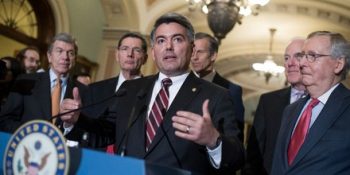-
Woody plants and perennials cannot be sold with insect or disease infestations.
-
Woody plants and perennials cannot be sold with roots that are girdling, indicating that the tree or shrub has been in the container too long or in the balled and burlapped state too long.
-
Turfgrass sod cannot be sold if it contains more than 3 weeds in a 6 x 6 foot (or 36 square foot) area.
-
Check with the CDA to make sure that the company or person you are purchasing your woody plants, turfgrass sod and perennials from is registered to sell nursery stock. By state law they have to be registered to sell nursery stock. The Nursery Act is a consumer protection law and all woody plants, sodand perennials sold within the state of Colorado and the people who sell them fall under the jurisdiction of this law and the Colorado Department of Agriculture.
Blog
-

Buyer Beware: Watch Out for Free Tree and Landscaping Deals
BROOMFIELD — The Colorado Department of Agriculture (CDA), Colorado Nursery and Greenhouse Association (CNGA) and the Associated Landscape Contractors of Colorado (ALCC) are warning consumers to be wary of trees, shrubs, perennial plants and turf grass sod that is included for “free” with the cost of exorbitant planting and landscaping costs. CNGA, ALCC and CDA all work together to protect consumers.“There is a consumer protection concern when plants are offered for ‘free’ with the purchase of the landscaping installation. More often than not, the quality of the plants included with these too-good-to-be-true landscaping offers is very poor and does not meet minimum industry or mandated standards in the Colorado Nursery Act,” said CDA’s Program Manager for the Nursery, Phytosanitary, Plant-Pest Quarantine, and Seed programs, Laura Pottorff. “Trees and other landscape plants are a significant investment made to add value to our property. Be wise and informed.”While the Department of Agriculture cannot regulate how the plant is planted, it can regulate quality of woody plant material, turfgrass sod, and perennials at the time of sale. CDA helps protect the consumer by ensuring that the product they see at the retail nursery or receive from the landscape contractor meetsminimum standard for plant health and quality.The Colorado Nursery Act requires that all people who sell nursery stock (trees, shrubs, turfgrass sod and other perennial plants) be registered to do so. If this plant material is offered for sale, it must meet strict standards for plant health and pest freedom that gives trees and other plants a “leg up” and increases likelihood of survival.Consumers are encouraged to ask the nursery or landscape contractor if they are a member of their local industry association, such as CNGA or ALCC. Member companies often go above and beyond to make sure they meet industry best practices. Industry best practices make sure that trees have adequate root systems to survive and adjust to transplanting in Colorado’s challenging landscapes, adding long term value to a landscape.Member companies follow best management practices that include endorsement of certain tree trunk diameter to root diameter ratios. For example, the best management practice for root balls is that for every caliper inch of trunk width measured at 6” above soil line for a deciduous tree (trees that loose leaves each autumn) there should be at least 10 inches of root ball to match. Similar standards exist for coniferous trees. CNGA and ALCC member companies will also strive to meet industry best planting standards as well. Best planting standards are researched by universities and other scientists in Colorado to ensure best success of trees and shrubs planted in our area.By law:“If nursery stock is offered for ‘free,’ it may not meet state or industry minimum standards; consumers run the risk of paying for installation services and winding up with poor quality or soon to be dead trees and shrubs,” continued Pottorff. “If possible, go to the nursery and pick out the tree or plants you want. When those plants are delivered to you and planted in your landscape watch them closely for the first few weeks and months to make sure they appear to be growing normally.”The CDA routinely inspects plants at most of the nurseries in our state. The results of these inspections and any conditions under advisory or Stop Sale that were found during an inspection are available to the public. Contact us at 303-869-9070 or visit www.colorado.gov/nursery. -

JON GRAY TO DONATE EIGHT INCHES OF HAIR TO LOCKS OF LOVE
WHO: Colorado Rockies right-handed pitcher Jon Gray
Floyd’s 99 Barbershop
Locks of Love
WHAT: Gray will have eight inches of his hair cut and donated to Locks of Love, a public non-profit organization that provides hairpieces to financially disadvantaged children, age 21 and under, suffering from long-term medical hair loss from any diagnoses.
WHEN: Tuesday, April 11, 2017 / 1:30 p.m.
WHERE: Coors Field interview room
WHY: Jon and Jacklyn Gray are excited for the opportunity to make a difference in the lives of children with long-term medical hair loss.
For more information, please contact the Rockies communications department.
-

Fort Collins Music eXperience hosts Kickoff Party at CSU’s Ramskeller Thursday
FORT COLLINS — The Fort Collins Music Association will present “The FoCoMX Kickoff Party” on Thursday, April 13, at 4 p.m. in the Ramskeller, the Colorado State University pub located in the basement of the Lory Student Center.
The Kickoff Party is a pre-show for FoCoMA’s music festival FoCoMX, or the Fort Collins Music eXperience. The Kickoff Party, which is free for all ages, will feature live music performed by Slow Caves and HoldFast., two Fort Collins-based bands. Guests can purchase food and drink at the Ramskeller.
The Kickoff Party aims to raise ticket sales for FoCoMX, and tickets will be available at the event. Each ticket purchased at the party enters buyers into a raffle. There will be three drawings for the raffle at the end of the party, and students can win a $130 gift card to the CSU Bookstore, a $120 gift card to King Soopers or a $50 gift card to Tony’s.
Tickets for FoCoMX, which takes place April 28 and 29, can be purchased either at the Kickoff Party or April 10-13 at the CSU Flea Market, which is across from the Bookstore on the second floor of the LSC. FoCoMX features more than 200 bands across 20 venues around Fort Collins. This is FoCoMX’s ninth year, and will include performances by Slow Caves and Holdfast. The entire lineup can be found at Focomx.focoma.org.
Slow Caves, a synth-punk band, is made up of CSU alumni. They formed Slow Caves in Fort Collins in 2014, and since then, the band has gained acclaim across the Denver music scene. The band members are childhood friends David Dugan, Jackson Lamperes and brothers Jakob and Oliver Mueller. The Mueller brothers are both vocalists and guitar players, while Dugan plays guitar/bass and Lamperes plays the drums. In harmony, the group has a “surf-inflected pop vibe,” Westword wrote in April 2016.
In 2015, the band played at the Austin music festival South by Southwest (SXSW). Slow Caves also showcased at the CMJ Music Marathon in New York City that year. So far, 2017 has been a busy year for Slow Caves. They appeared again at SXSW in March and continue their tour in Colorado, Utah, California, Idaho, New Mexico, Arizona, Kansas, Texas and New York, at the end of June.
HoldFast., formed by three brothers from Fort Collins in 2011, is an alternative rock band. They describe their lyrics and sound as “loud, honest and infectious.” The band members are Charlie Maddocks, Mikey Maddocks and Tommy Maddocks. Charlie is the lead vocalist, but he receives support in backup vocals from brother Mikey, who also plays bass. Tommy, the heart of Holdfast.’s sound, plays the drums.
The band’s name always includes the period that follows it, but the band is anything but halted. They have graced FoCoMX with their musical presence in previous years. HoldFast. released its debut single, “Because of You,” late in the summer of 2016.
Slow Caves and Holdfast. both can be found on YouTube, Spotify and Soundcloud.
For more information, visit Focomx.focoma.org and stay tuned to CSU accounts on Twitter, Instagram and Snapchat at @ColoradoStateU throughout the week for updates before and during the show.
-

Updated Schedule of Events: Monday, April 10
While many of the regularly-scheduled monthly events and meetings have not had their dates or times changed, many school-related activities, particularly sporting events, have been changed. The updated listing below is for today, Monday, April 10. An updated list for the rest of the week will be posted later.
Monday, April 10
Byers Fire Protection District Board. 6:30 p.m., Byers Firehouse.
Byers Water & Sanitation District Board. 7 p.m., District Office, 421 S. Sherman St.
Comanche Crossing Historical Society. 7 p.m., museum office, 56060 E. Colfax Ave., Strasburg.
Girls Golf: Strasburg @ Jefferson Academy Tournament, Indian Tree Golf Club, Arvada.
Girls Soccer: Clear Creek @ Bennett, 4:30 p.m.
Track & Field: Byers & Deer Trail @ Elbert Invitational, 8:30 a.m., going all day
Baseball: Bruce Randolph @ Bennett (Varsity DH), 3:30 p.m. -

Five-Week Heat Is On DUI Enforcement Begins Today
1,555 Arrested During 2016 Spring Events Enforcement
STATEWIDE — As warm weather beckons Coloradans outdoors, the Colorado Department of Transportation (CDOT), Colorado State Patrol (CSP) and local law enforcement agencies are set to collaborate for the latest The Heat Is On DUI enforcement in an effort to curb impaired driving. The Spring Events enforcement begins today, April 7, and continues through May 15, coinciding with annual spring celebrations and festivities — graduations, spring breaks, outdoor festivals, the start of baseball season and numerous 4/20 events — where alcohol and cannabis may be consumed.
Last year, 1,555 impaired drivers were arrested during the five-week enforcement. This year’s crackdown involves 108 law enforcement agencies statewide.
“With warmer weather, we know more Coloradans will hit the roads to enjoy the outdoors,” said Darrell Lingk, Director of CDOT’s Office of Transportation Safety. “We ask those who drink alcohol or consume cannabis do so only if they plan a sober ride. Impaired driving is not a risk worth taking.”
In April and May 2016, there were 94 traffic fatalities on Colorado roads. Of these, 38 (40 percent) involved impaired drivers.
“Law enforcement is determined to keep Colorado’s roads safe and prevent impaired driving crashes from occurring year-round,” said Col. Scott Hernandez, Chief of the Colorado State Patrol. “The Spring Events enforcement reinforces this mission and reminds motorists to plan a sober ride to and from their destinations.”
The start of spring also marks the return of Colorado Rockies baseball, and CDOT is bringing impaired driving awareness to Coors Field this season. Posters will be placed throughout the stadium and a public service announcement (PSA) video featuring Rockies players will be played on the Jumbotron each game, both reminding fans to enjoy the game responsibly. CDOT will also host a “stadium take-over” during games with every digital screen displaying the message: “Choosing to Drink? Don’t Risk a DUI.”
The CDOT Highway Safety Office provides funding to Colorado law enforcement for impaired driving enforcement, education and awareness campaigns. The Heat Is On campaign runs throughout the year with 12 specific high-visibility impaired driving enforcement periods centered on national holidays and large public events. Enforcement periods can include sobriety checkpoints, saturation patrols and additional law enforcement on duty dedicated to impaired driving enforcement. More details about the campaign, including impaired driving enforcement plans, arrest totals and safety tips can be found at HeatIsOnColorado.com.
-

Perlmutter to Make Announcement Sunday in Golden
GOLDEN — Ed Perlmutter will make an announcement on Sunday, April 9 in Golden, CO. Perlmutter is currently the Democratic U.S. Representative for Colorado’s 7th Congressional District.
WHEN: Sunday, April 9, 2017 | 1:00 p.m. MT
WHERE: Natural Grocers | 2401 Ford Street | Golden, CO 80401
WHO: Perlmutter, friends and neighbors, local Coloradans
BACKGROUND:
A lifelong resident of Jefferson County, Ed and his family have deep roots in Colorado. Ed graduated from Jefferson High School in Edgewater and earned his undergraduate degree and Juris Doctor from the University of Colorado Boulder. His grandfather and father ran a local concrete business for decades where Ed helped as a laborer during the summers in college and law school. Ed went on to practice business law with a local law firm for 25 years while raising his family in Jefferson County where his three daughters also attended Jefferson County public schools.
Since being first elected to the Colorado State Senate in 1994, Ed has worked hard to improve the quality of life for hardworking Coloradans. During his two terms in the State Senate, Ed became known for his bipartisan approach and work on issues such as renewable energy and smart growth policies.
In 2006, Ed was elected to represent the 7th Congressional District in Congress and quickly earned a reputation as someone who gets things done for Colorado. In Congress, Ed has been a champion for Colorado and is regarded as one of the most bipartisan members in Congress. In the 113th Congress, Georgetown University’s Lugar Center/McCourt School recognized Ed as the 23rd most bipartisan Representative in Congress and the most bipartisan member of Colorado’s delegation.
Ed’s work in Congress includes protecting and creating good-paying jobs in Colorado including fighting for funding for the National Renewable Energy Lab in Golden and protecting thousands of jobs as part of the Orion manned space flight program. Ed has also been a bulldog when it comes to ensuring the new VA Medical Center is completed to serve Veterans across the Rocky Mountain region. With his bipartisan approach and effective leadership, Ed was re-elected five times in one of the most competitive congressional districts in the United States.
Ed currently lives in Arvada with his wife, Nancy, a retired public school teacher. Their blended family includes six grown children and three spouses: Alexis and her husband Matt, Abby and her husband Jonny, Zoe, David, Jane, and Matt and his wife Clare. In September 2016, Ed and Nancy welcomed their first grandchild, Fin.
Since 2007, Ed has been working hard on behalf of hardworking Coloradans:
· Jobs & the Economy: Ed’s number one priority has been creating more opportunity for the hardworking folks in Colorado. From supporting the Small Business Jobs Act to advocating for the new Denver Patent Office, Ed supports policies and initiatives that create good-paying jobs and expands economic opportunity for all Coloradans.
· Infrastructure: Ed has been a champion for critical infrastructure and light rail and public transportation projects across Colorado, including the Gold Line, West Line, A-Line from Union Station to DIA, and the Managed Lanes/Bus Rapid Transit Project. In 2015, Ed supported the FAST Act which provides $3.4 billion in direct highway and transit formula funds for Colorado over the next five years. In addition, Ed helped secure FEMA assistance for Colorado flood recovery efforts and raise the FHWA infrastructure cap to $500 million to provide the flexibility needed to address the infrastructure rebuilding costs.
· Education and Student Loan Debt: Ed supported the Every Child Succeeds Act to allow states to set their own standards and maintain strong accountability. In addition, Ed has worked hard to reduce the student loan debt by supporting policies to increase the level of Pell grants, reduce student loan interest rates, increase the maximum tax deduction for interest paid on any qualified education loan, and create student repayment programs in exchange for community service.
· Veterans and the New VA Medical Center: Ed has been a bulldog to make sure the new VA Medical Center is completed to serve Veterans across the Rocky Mountain region, including playing a critical role in securing the final funding and authorization for the facility in 2016. In addition, Ed supports legislation to put Veterans back to work when they return home and ensure they receive the benefits they need and deserve.
· Immigration: Immigration is vital to Colorado’s economy which is why Ed supports comprehensive immigration reform that will create jobs, lower the deficit, strengthen our borders and provide an earned pathway to citizenship for undocumented Americans who are paying taxes and learning English.
· Energy/Environment: Ed has been a tireless advocate for renewable energy and energy efficiency initiatives, including supporting legislation to give national labs like NREL in Golden the tools and funding they need to work toward energy independence.
-

Gardner makes statement on Syria strikes
WASHINGTON, DC — United States Senator Cory (R-CO) Gardner, a member of the Senate Foreign Relations Committee, made the following statement tonight after reports of US strikes in Syria:
“Tonight, the United States of America took action against a treacherous regime whose actions and allies have shown the world the dark edge of humanity. The use of chemical weapons is illegal under international law and the Administration is well justified taking this long-overdue action tonight against a designated state sponsor of terrorism.
“I believe this action must be part of a broader strategy to achieve the following U.S. national security goals: to ultimately remove a brutal and lawless regime from power that is in violation of international law, to eradicate the Islamic State and associated groups, and to achieve a clear humanitarian goal of saving the Syrian people from slaughter.
“I hope our partners in freedom and dignity will see this U.S. leadership as the first act of a global partnership to end this chapter of depravity.”
-

Soldiers and Vehicles will travel from a southern Colorado Army post to a remote training site
FORT CARSON (AP) — Nearly 6,000 soldiers, hundreds of vehicles and 30 helicopters will travel from a southern Colorado Army post to a remote training site for a two-week training exercise.
The Army said Wednesday the exercise will take place in late April at the Pinon (PIN’-yun) Canyon Maneuver Site.
Ground convoys will make the 140-mile (225-kilometer) trip from Fort Carson in Colorado Springs to the maneuver site between April 11 and April 22. They will return in early May.
The Army says each convoy will have up to 30 vehicles and travel 40 mph (64 kph) on two routes. Convoys will be 30 minutes apart and won’t travel in urban areas during peak rush hours.
The Army says the exercise will involve night and day maneuvers and will increase dust and noise levels.
-

State-private partnerships pave way for progress on plague vaccine campaigns
DENVER – While a drone dropping peanut butter-flavored baits makes national headlines there’s an untold, Colorado-centric backstory on how those little blue baits came to be. It’s a story of creativity, trial-and-error experimentation, and a machine originally designed to make carp bait.
This time last year federal and state wildlife managers, hoping to deploy an anti-plague vaccine that may aid in efforts to recover the endangered black-footed ferret, had a problem: No one knew how to mass-produce the baits that carry the vaccine quickly and affordably enough to supply the demands for their expanding field vaccination campaigns.
Enter scientists from Colorado Parks and Wildlife, who already had been working behind the scenes on several fronts for years to advance the science on controlling plague on a limited geographic scale for conservation purposes.
“Until last spring, the production model for plague vaccine baits was akin to boutique fudge-making,” said Dan Tripp, a researcher with CPW. “Vaccination is only going to be practical on tracts of a few thousand acres or less where protecting prairie dogs from plague is the desired goal. But before we could even begin thinking about treating 1,000-acre blocks of habitat we needed a way to make more than a few hundred baits at a time. Cheap!”
Tripp, along with assistant Lucy Corro and Scott Stelting, a former USDA scientist now with CORE Formulations LLC, began experimenting with the vaccine bait formula and a relatively inexpensive piece of machinery called a “boilie roller” that is popular in Europe for making custom-made carp fishing baits.
“Our federal collaborators wanted bait balls that could be fed through a hopper carried by a drone,” said Tripp. “The original baits were like hand-crafted gummy cubes. We tried to make dried bait balls from the original recipe, but they were too brittle. So we had to experiment with ingredient proportions and timing to get everything working. Then it was time to fish or roll bait.”By May 2016, the new techniques for mass-producing bait balls were in use at CPW and USDA facilities in Fort Collins. As a result, federal and state agencies’ vaccine bait needs for the ramped-up 2016 field season were met in a five-week production run. The resulting baits were small, light, and – most importantly – by autumn already successfully field tested in two different mechanical delivery devices. CPW also contributed directly to the ongoing design and development of mechanical delivery devices to streamline vaccine bait distribution.
And what about the blue color? A small field study that Tripp conducted in 2015 built upon work from the 1960s showing that prairie dogs seem to discern blue from other colors. Combining blue coloration with the scent of peanut butter seemed a good strategy for ensuring prairie dogs could locate smaller baits on the ground. Switching to the blue food-grade coloring also shaved costs and greatly simplified the bait production process.
Another unheralded player in the scaled-up anti-plague campaign is Colorado Serum Company, a federally-licensed vaccine company that has provided nearly a century of animal health care service. In 2015, Colorado Serum secured federal authorizations and agreements allowing the company to mass-manufacture the anti-plague vaccine.
“We had to find ways of coaxing the vaccine virus to multiply faster and in much larger quantities,” said Randy Berrier, vice president of technical services and business development with Colorado Serum Company. “We spent several months developing techniques to improve the vaccine yields, and succeeded just in time to meet all of the agencies’ needs for the 2016 field season. And we’re even more ready to be of service again in 2017.”
CPW and Colorado Serum also partnered last spring to make sure the new mass-manufactured vaccine baits still performed as well as the hand-made variety used in years past. A CPW study in captive prairie dogs that began last June showed the commercial-source vaccine was still safe in prairie dogs and stimulated antibody responses as expected.
And as a final testament to Colorado’s commitment to combating plague for wildlife conservation purposes, the efforts undertaken to scale-up vaccine bait manufacturing for the benefit of wildlife in Colorado and elsewhere were largely paid for through the state’s Species Conservation Trust Fund thanks to annual severance tax funding authorized by the Colorado General Assembly.
Colorado’s wildlife managers have been especially motivated to make plague control tools more widely available because three of the nation’s four prairie dog species call Colorado home. All three species have at some point in the recent past been considered for federal listing as threatened or endangered.
Plague, a disease once exotic to Colorado, is currently the single greatest threat to the few remaining strongholds for prairie dogs. Plague outbreaks also have caused repeated failures in federal attempts to restore the black-footed ferret, a species that depends on prairie dogs for survival.“We are very optimistic that this new tool to combat sylvatic plague in prairie dog colonies will work not only for the benefit of black-footed ferret recovery, but also for the private landowners who are voluntarily working to recover the species. Additionally, these efforts will be potentially beneficial in ensuring that prairie dog species are not federally listed,” said Ken Morgan, private lands program manager with CPW. “We are especially indebted to the local governments and willing landowners who have been cooperating in implementing these conservation measures for the benefit of the entire state.”
“I hope Coloradans will take pride that our CPW and private sector partners stepped up in such a pivotal way to advance this conservation tool,” said Bob Broscheid, director of CPW. “This embodies Gov. Hickenlooper’s commitment to effective, efficient and elegant work in state service.”
Read more about the story of vaccine bait mass-manufacturing in a new research letter just published in the Journal of Wildlife Diseases.
-

Bill to address Colorado Parks and Wildlife financial sustainability introduced at General Assembly
Colorado lawmakers this week introduced House Bill 17-1321 designed to bring a stable and sustainable funding source to Colorado Parks and Wildlife (CPW). The bill’s introduction follows more than a year of public meetings with legislators and outdoor enthusiasts across Colorado to gather feedback on addressing the agency’s financial challenges.
As an enterprise agency that gets less than one tenth of one percent of its budget from the general fund, CPW relies on revenue from hunters, anglers and park visitors to cover its expenses, but it lacks the ability to set and adjust fees to cover the rising costs associated with managing wildlife, conserving and enhancing habitat and maintaining and improving parks in our fast-growing state.
Park visitation continues to rise, but a statutory cap on park fee income means CPW lacks resources to meet increasing park operational costs to keep up with greater demand. Resident hunting and fishing license fees were last set by the legislature in 2005. Since then, inflation has cut CPW’s spending power by 22 percent. That has led the agency to defund 50 positions and cut $40 million from its budget, as well as defer maintenance on its 110 dams.
The funding shortfall is having significant consequences. Those include restricting boater access on reservoirs with unfunded inspection stations for invasive species, and the elimination or contraction of popular activities such as Fishing is Fun and the Big Game Access Program that bring new participants to outdoor sports, as well as grants for wetlands, boating and habitat protection.
The bill, with bipartisan sponsorship from Representatives Arndt, Wilson, Catlin, McLachlan, Mitsch Bush and Rankin, would provide the 11-member Parks and Wildlife Commission – which governs the agency – with authority to set parks, hunting and fishing fees within a legislatively mandated cap. The bill would allow the CPW Commission to:
· Increase individual park fees, as well as resident hunting and fishing licenses generally by no more than 50 percent. Sets the fee for an annual senior fishing license at no more than one-half the price of annual resident fishing licenses.
· Increase application fees for hunting licenses allocated through a drawing to $20.
· Establish Aquatic Nuisance Species watercraft sticker fees at $15 (non-motorized over 10 feet), $25 (in-state motorized) and $50 (out-of-state-motorized).
The bill would also allow for increases in certain non-resident license fees (primarily fishing and small game) as well as allow future resident and nonresident fee changes based on the Consumer Price Index. The legislature will retain the ability to alter the fee structure in the future and also retains authority over CPW’s annual budget, including how increased revenue from fees is used.
Passage of the bill would not lead CPW to seek immediate fee increases that hit the 50 percent cap. The CPW Commission will invite additional public input before any fee increases are contemplated and implemented.
CPW’s financial projections show that $14 million in additional revenue will be needed by 2023 simply to maintain current wildlife-related levels of service, and $6.5 million more by that year to maintain existing park operations. Providing additional services requested by the public, and expanding the park system would require $22 million beyond those figures. In addition, a stable annual funding source for the $4.5 million aquatic nuisance species inspection program is necessary to ensure that Colorado’s lakes remain open to recreation.
“Coloradans care deeply about their wildlife and our state parks are more popular than ever. Colorado Parks and Wildlife is proud of the work it does and wants to ensure that we’re able to give our hunters, anglers, wildlife watchers, boaters, campers and others the chance to fully enjoy the treasures Colorado has to offer,” said CPW Director Bob Broscheid. “We look forward to continuing our collaboration with legislators, and we appreciate their hard work on these issues, as together we forge a path toward financial sustainability for managing and protecting our wildlife, habitat and parklands.”
For additional information about CPW’s financial sustainability, visit: http://cpw.state.co.us/Sustainability-Bill